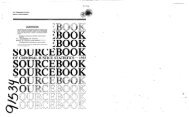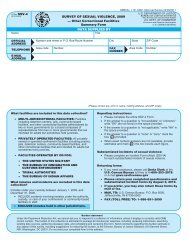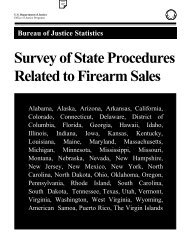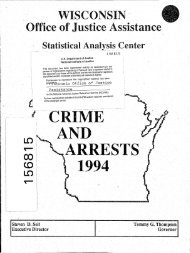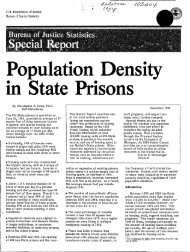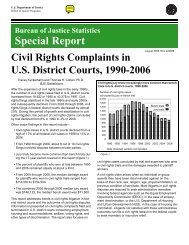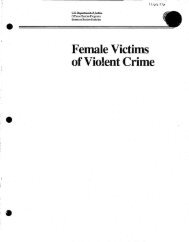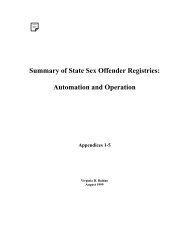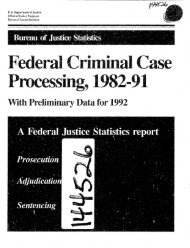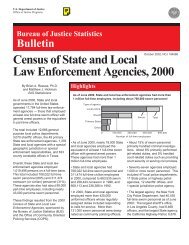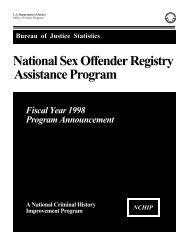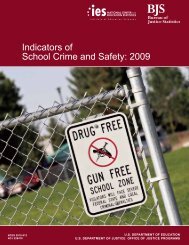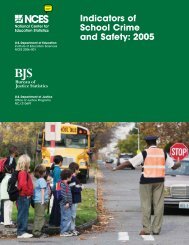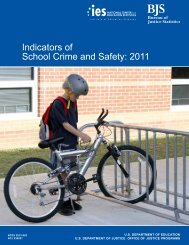FY 2012 NICS Act Record Improvement Program (NARIP) Solicitation
FY 2012 NICS Act Record Improvement Program (NARIP) Solicitation
FY 2012 NICS Act Record Improvement Program (NARIP) Solicitation
Create successful ePaper yourself
Turn your PDF publications into a flip-book with our unique Google optimized e-Paper software.
U.S. Department of Justice OMB No. 1121-0329Office of Justice <strong>Program</strong>sBureau of Justice StatisticsThe U.S. Department of Justice (DOJ), Office of Justice <strong>Program</strong>s (OJP), Bureau of JusticeStatistics (BJS) is pleased to announce that it is seeking applications for funding under the <strong>2012</strong>National Instant Criminal Background Check System (<strong>NICS</strong>) <strong>Act</strong> <strong>Record</strong> <strong>Improvement</strong> <strong>Program</strong>(<strong>NARIP</strong>). <strong>NARIP</strong> implements the grant provisions of the <strong>NICS</strong> <strong>Improvement</strong> Amendments <strong>Act</strong> of2007 (Pub. L. No.110-180 (codified at 18 U.S.C. § 922 note)) enacted on January 8, 2008. Theprogram furthers the Department’s mission by improving the records available to <strong>NICS</strong>. This isaccomplished by helping eligible states and tribes to improve the completeness, automation andtransmittal of records to state and federal systems. For the purpose of this solicitation, the term“state” includes the District of Columbia and U.S. territories.<strong>FY</strong> <strong>2012</strong> <strong>NICS</strong> <strong>Act</strong> <strong>Record</strong> <strong>Improvement</strong> <strong>Program</strong> (<strong>NARIP</strong>)EligibilityEligible applicants are limited to: (a) the agency designated by the Governor to administer theNational Criminal History <strong>Improvement</strong> <strong>Program</strong> (NCHIP); (b) the state or territory centraladministrative office or similar entity designated by statute or regulation to administer federalgrant funds on behalf of the jurisdiction’s court system; or (c) federally recognized Indian tribalgovernment. Additionally, there are two specific conditions associated with eligibility for grantsunder this program (see “Eligibility” on page 3.)DeadlineApplicants must register with Grants.gov prior to submitting an application. (See “How toApply,” page 10.) All applications are due by 11:59 p.m. eastern time on May 14, <strong>2012</strong>. (See“Deadlines: Registration and Application,” page 3.)Contact InformationFor technical assistance with submitting an application, contact the Grants.gov CustomerSupport Hotline at 800-518-4726, 606-545-5035, or via e-mail to support@grants.gov.Note: The Grants.gov Support Hotline hours of operation are 24 hours a day, 7 days a week,except federal holidays.For assistance with any other requirements of this solicitation, contact Devon B. Adams, Chief,Criminal Justice Data <strong>Improvement</strong> <strong>Program</strong>, by telephone at 202-307-0765 or by e-mail ataskbjs@usdoj.gov. Include “<strong>2012</strong><strong>NARIP</strong>” in the subject line.Grants.gov number assigned to announcement: BJS-<strong>2012</strong>-3259Release Date: March 23, <strong>2012</strong>
<strong>FY</strong> <strong>2012</strong> <strong>NICS</strong> <strong>Act</strong> <strong>Record</strong> <strong>Improvement</strong> <strong>Program</strong> (<strong>NARIP</strong>)(CFDA # 16.813)OverviewBJS is publishing this notice to announce the continuation of the National Instant CriminalBackground Check System (<strong>NICS</strong>) <strong>Act</strong> <strong>Record</strong> <strong>Improvement</strong> <strong>Program</strong> (<strong>NARIP</strong>) in Fiscal Year(<strong>FY</strong>) <strong>2012</strong>, identify the program priorities, and provide information on application requirements.<strong>Program</strong> goalsThe <strong>NICS</strong> <strong>Improvement</strong> Amendments <strong>Act</strong> of 2007, Pub. L. No. 110-180 (“the NIAA”) was signedinto law on January 8, 2008. The NIAA amends the Brady Handgun Violence Prevention <strong>Act</strong> of1993 (“the Brady <strong>Act</strong>”) (Pub. L. No. 103-159), under which the Attorney General established<strong>NICS</strong>. Among other things, the Brady <strong>Act</strong> requires Federal Firearms Licensees (FFLs) tocontact the <strong>NICS</strong> before transferring a firearm to an unlicensed person to obtain information onwhether the proposed transferee is prohibited from receiving or possessing a firearm understate or federal law.The NIAA was enacted in the wake of the April 2007 shooting tragedy at Virginia Tech. TheVirginia Tech shooter was able to purchase firearms from an FFL because information about hisprohibiting mental health history was not available to the <strong>NICS</strong>, and the system was thereforeunable to deny the transfer of the firearms used in the shootings. The NIAA seeks to addressthe gap in information available to <strong>NICS</strong> about such prohibiting mental health adjudications andcommitments and other prohibiting factors. Filling these information gaps will better enable thesystem to operate as intended to keep guns out of the hands of persons prohibited by federal orstate law from receiving or possessing firearms. The automation of records will also reducedelays for law-abiding gun purchasers.The NIAA authorized a grant program to assist states in providing certain information to the<strong>NICS</strong>, and prescribes grant penalties for non-compliance with the <strong>Act</strong>’s record completenessgoals. Additionally, pursuant to the <strong>Act</strong>, there are certain conditions, described on page 3 under“Eligibility,” that a state must satisfy in advance of receiving grants under the <strong>Act</strong>.Deadlines: Registration and ApplicationApplicants must register with Grants.gov prior to submitting an application. OJP encouragesapplicants to register several weeks before the application submission deadline. The deadline toapply for funding under this announcement is 11:59 p.m. eastern time on May 14, <strong>2012</strong>. Seethe “How to Apply” section on page 10 for details.EligibilityThe NIAA provides that the grants authorized are to be made in a manner consistent with theNational Criminal History <strong>Improvement</strong> <strong>Program</strong> (NCHIP).OMB No. 1121-0329Approval Expires 02/28/20133BJS-<strong>2012</strong>-3259
• The Brady Handgun Violence Prevention <strong>Act</strong> (Brady <strong>Act</strong>), Pub. L. No. 103-159, 107Stat.1536 (1993), codified as amended at 18 U.S.C. Section 921 et seq.;• The National Child Protection <strong>Act</strong> of 1993 (NCPA), Pub. L. No. 103-209, 107 Stat. 2490(1993), codified as amended at 42 U.S.C. Sections 3759, 5101 note, 5119, 5119a,5119b, 5119c;• Those provisions of the Omnibus Crime Control and Safe Streets <strong>Act</strong> of 1968 (Omnibus<strong>Act</strong>), Pub. L. No. 90-351, 82 Stat. 197 (1968), codified as amended at 42 U.S.C. Section3711 et seq., as amended; and the Violent Crime Control and Law Enforcement <strong>Act</strong> of1994 (Violent Crime Control <strong>Act</strong>), Pub. L. No.103-322, 108 Stat. 1796 (1994), whichpertain to the establishment, maintenance, analysis, or use of criminal history recordsand criminal record systems;• Relevant requirements of the Jacob Wetterling Crimes Against Children and SexuallyViolent Offender Registration <strong>Act</strong>, Pub. L. No. 103-322, 108 Stat. 2038, Megan's Law,Pub. L. No. 104-145, 110 Stat. 1345, and the Pam Lychner Sexual Offender Trackingand Identification <strong>Act</strong> of 1996, Pub. L. No. 104-236, 110 Stat. 3093; and Title 1 of theAdam Walsh Child Protection and Safety <strong>Act</strong> of 2006, Pub. L. No.109-248; and• The Victims of Trafficking and Violence Protection <strong>Act</strong> of 2000, Pub. L. No. 106-386, 114Stat. 1464 (2000) and related laws pertaining to the identification, collection, analysisand interstate exchange of records relating to domestic violence and stalking (includingprotection orders).<strong>Record</strong> Completeness Goals and IncentivesThe NIAA has provisions that require states to meet specified goals for completeness of therecords submitted to the Attorney General identifying individuals prohibited by federal law frompossessing firearms. The records covered include automated information needed by the <strong>NICS</strong>to identify felony convictions, felony indictments, fugitives from justice, drug arrests andconvictions, prohibiting mental health adjudications and commitments, domestic violenceprotection orders, and misdemeanor crimes of domestic violence. The <strong>Act</strong> provides a number ofincentives for states to meet the goals it sets for greater record completeness:• First, the <strong>Act</strong> allows states to obtain a waiver, beginning in 2011, of the state matchingrequirement under the NCHIP grant program, if a state provides at least 90 percent of itsrecords identifying persons in specified prohibited categories;• Second, the <strong>Act</strong> authorizes grant programs described herein, which, pursuant to the <strong>Act</strong>,are being administered consistent with NCHIP, for state executive and judicial agenciesto establish and upgrade information automation and identification technologies fortimely submission of final criminal record dispositions and other information relevant to<strong>NICS</strong> checks; and• Finally, the <strong>Act</strong> provides for discretionary and mandatory Byrne Justice Assistance Grant(JAG) program funding penalties, unless the penalties are waived by the AttorneyGeneral for good cause. The penalties are specified in relation to meeting recordcompleteness requirements and the time lapsed from January 8, 2008, when NIAA wasOMB No. 1121-0329Approval Expires 02/28/20135BJS-<strong>2012</strong>-3259
• supply accurate and timely information to the Attorney General concerning finaldispositions of criminal records to databases accessed by <strong>NICS</strong>;• supply accurate and timely court orders and records of misdemeanor crimes of domesticviolence for inclusion in federal and state law enforcement databases used to conduct<strong>NICS</strong> background checks;• collect and analyze data needed to demonstrate levels of state compliance with theNIAA; and• maintain the required relief from disabilities program in accordance with the NIAA(however, by statute not less than 3 percent and no more than 10 percent of each grantshall be used for this purpose).State Court GrantsSection 301 of the NIAA provides that grants shall be made to each state or tribal government,consistent with plans for the integration, automation, and accessibility of criminal historyrecords, for use by the court systems to improve automation and transmittal to federal and staterepositories of: (1) criminal history dispositions; (2) records relevant to determining whether aperson has been convicted of a misdemeanor crime of domestic violence or whether a person isa subject of a prohibiting domestic violence protection order; and (3) prohibiting mental healthadjudications and commitments.Further, the law provides that the amounts granted shall be used by the court system only toimplement—• assessments, as necessary, of the capabilities of state courts to automate and transmitarrest and conviction records, court orders, and mental health adjudications orcommitments to federal and state record repositories; and• policies, systems, and procedures to automate and transmit arrest and convictionrecords, court orders, and mental health adjudications or commitments to federal andstate record repositories.Amount and Length of AwardsAll awards are subject to the availability of appropriated funds and to any modifications oradditional requirements that may be imposed by law.<strong>FY</strong> <strong>2012</strong> <strong>NARIP</strong> awards will be made for up to 24 months. Funded activities may begin on orafter October 1, <strong>2012</strong>. All activities must be scheduled to be completed by September 30, 2014.Budget InformationLimitation on Use of Award Funds for Employee Compensation; WaiverWith respect to any award of more than $250,000 made under this solicitation, federal fundsmay not be used to pay total cash compensation (salary plus bonuses) to any employee of theOMB No. 1121-0329Approval Expires 02/28/20137BJS-<strong>2012</strong>-3259
award recipient at a rate that exceeds 110% of the maximum annual salary payable to amember of the Federal Government’s Senior Executive Service (SES) at an agency with aCertified SES Performance Appraisal System for that year. The <strong>2012</strong> salary table for SESemployees is available at www.opm.gov/oca/12tables/indexSES.asp. Note: A recipient maycompensate an employee at a higher rate, provided the amount in excess of this compensationlimitation is paid with non-federal funds. (Any such additional compensation will not beconsidered matching funds where match requirements apply.)The limitation on compensation rates allowable under an award may be waived on an individualbasis at the discretion of the Director of BJS. An applicant requesting a waiver should include adetailed justification in the budget narrative of its application. Unless the applicant submits awaiver request and justification with the application, the applicant should anticipate that OJP willrequest the applicant to adjust and resubmit its budget.The justification should include the particular qualifications and expertise of the individual, theuniqueness of the service being provided, the individual’s specific knowledge of the program orproject being undertaken with award funds, and a statement explaining that the individual’ssalary is commensurate with the regular and customary rate for an individual with his/herqualifications and expertise, and for the work to be done.Minimization of Conference CostsNo OJP funding can be used to purchase food and/or beverages for any meeting, conference,training, or other event. Exceptions to this restriction may be made only in cases where suchsustenance is not otherwise available (i.e., extremely remote areas), or where a specialpresentation at a conference requires a plenary address where there is no other time forsustenance to be obtained. Such an exception would require prior approval from OJP. Thisrestriction does not apply to water provided at no cost, but does apply to any and all otherrefreshments, regardless of the size or nature of the meeting. Additionally, this restriction doesnot impact direct payment of per diem amounts to individuals in a travel status under yourorganization’s travel policy.Updated Department of Justice and OJP guidance on conference planning, minimization ofcosts, and conference cost reporting will be forthcoming and will be accessible on the OJPwebsite at www.ojp.usdoj.gov/funding/funding.htm.Costs Associated with Language Assistance (if applicable)If an applicant proposes a program or activity that would deliver services or benefits toindividuals, the costs of taking reasonable steps to provide meaningful access to those servicesor benefits by individuals with limited English proficiency may be allowable costs. Reasonablesteps to provide meaningful access to services or benefits may include interpretation ortranslation services where appropriate.For additional information, see the "Civil Rights Compliance" section of the OJP "OtherRequirements for OJP Applications" Web page(www.ojp.usdoj.gov/funding/other_requirements.htm).OMB No. 1121-0329Approval Expires 02/28/20138BJS-<strong>2012</strong>-3259
Match RequirementThis solicitation does not require a match. However, if a successful application proposes avoluntary match amount, the match amount incorporated into the OJP-approved budgetbecomes mandatory and subject to audit.Performance MeasuresTo assist the Department in fulfilling its responsibilities under the Government Performance andResults <strong>Act</strong> of 1993 (GPRA), Public Law 103-62, and the GPRA Modernization <strong>Act</strong> of 2010,Public Law 111–352, applicants that receive funding under this solicitation must provide datathat measure the results of their work done under this solicitation. Any award recipient will berequired, post award, to provide the data requested in the “Data Grantee Provides” column sothat OJP can calculate values for the “Performance Measures” column. Performance measuresfor this solicitation are as follows:Objective Performance Measure(s) Data Grantee ProvidesEnsure that theinfrastructure is developedto connect each state’sand tribe’s recordssystems to the nationalrecords systems operatedby the FBI, including theNational CrimeInformation Center(NCIC), the IntegratedAutomated FingerprintIdentification System(IAFIS), the IntegratedIdentification Index (III),and the National InstantCriminal BackgroundCheck System (<strong>NICS</strong>)Index.Number of states and tribesparticipating and/or makingrecords available to the<strong>NICS</strong> (within the 7categories).Total number of state and tribes participating and totalnumber of state and tribal records in the 7 categories.Number of state/tribal records made available for useby <strong>NICS</strong> in 7 categories, including:Category 1: <strong>Record</strong>s that identify a person who hasbeen convicted in any court of a crime punishable byimprisonment for a term exceeding 1 year (e.g.,federal or state felonies), and any state misdemeanorpunishable by imprisonment for more than 2 years.Category 2: <strong>Record</strong>s that identify a person who isunder an indictment or information returned or filedwith a court, or for whom a criminal complaint hasbeen issued or verified by a prosecutor for the crimesdescribed in Category 1.Category 3: <strong>Record</strong>s that identify a person who is afugitive from justice, as demonstrated by an activefelony or misdemeanor want or warrant.Category 4: <strong>Record</strong>s that identify a person who is anunlawful user of, or addicted to, any controlledsubstance, as demonstrated by specified arrests,convictions, and adjudications not protected fromdisclosure to the Attorney General by federal or statelaw.Category 5: <strong>Record</strong>s that identify a person who hasbeen adjudicated as a mental defective or who hasbeen formally and involuntarily committed to anymental institution when that information is notprotected from disclosure to the Attorney General byfederal or state law.Category 6: <strong>Record</strong>s that electronically available andidentify a person subject to an active court order (e.g.,OMB No. 1121-0329Approval Expires 02/28/20139BJS-<strong>2012</strong>-3259
issued by a criminal court or any civil court, such asdivorce court, family court, magistrate, or generaljurisdiction court) that restrains the person fromcommitting acts of violence against another person.Category 7: <strong>Record</strong>s that electronically available andidentify a person convicted in any court of amisdemeanor crime of domestic violence.Percentage of records madeavailable to <strong>NICS</strong> that arecomplete.Number of records made available to <strong>NICS</strong> that arecomplete.Number of records availablein <strong>NICS</strong>.Percentage of applicationsfor firearm transfers rejecteddue to data made availableto the <strong>NICS</strong>.Number of applications for firearm transfers.Number of applications for firearm transfers rejectedfor the presence of a domestic violence misdemeanorconviction.Number of applications for firearm transfers rejecteddue to the presence of a mental health prohibitor.Submission of performance measures data is not required for the application. Instead,applicants should discuss in their application their proposed methods for collecting data forperformance measures. Please refer to the section “What an Application Should Include” onpage 13 for additional information.Notice of Post-Award FFATA Reporting RequirementApplicants should anticipate that OJP will require all recipients (other than individuals) of awardsof $25,000 or more under this solicitation, consistent with the Federal Funding Accountabilityand Transparency <strong>Act</strong> of 2006 (FFATA), to report award information on any first-tier subawardstotaling $25,000 or more, and, in certain cases, to report information on the names and totalcompensation of the five most highly compensated executives of the recipient and first-tiersubrecipients. Each applicant entity must ensure that it has the necessary processes andsystems in place to comply with the reporting requirements should it receive funding. Reportsregarding subawards will be made through the FFATA Subaward Reporting System (FSRS),found at www.fsrs.gov.Please note also that applicants should anticipate that no subaward of an award made underthis solicitation may be made to a subrecipient (other than an individual) unless the potentialsubrecipient acquires and provides a Data Universal Numbering System (DUNS) number.How to ApplyApplications will be submitted through Grants.gov. Grants.gov is a “one-stop storefront” thatprovides a unified process for all customers of federal awards to find funding opportunities andapply for funding. Complete instructions on how to register and submit an application can befound at www.Grants.gov. If the applicant experiences technical difficulties at any point duringOMB No. 1121-0329Approval Expires 02/28/201310BJS-<strong>2012</strong>-3259
this process, call the Grants.gov Customer Support Hotline at 800-518-4726 or 606-545-5035,24 hours a day, 7 days a week, except federal holidays. Registering with Grants.gov is a onetimeprocess; however, processing delays may occur, and it can take up to several weeksfor first-time registrants to receive confirmation and a user password. OJP highly recommendsthat applicants start the registration process as early as possible to prevent delays in submittingan application package by the specified application deadline.All applicants are required to complete the following steps:1. Acquire a Data Universal Numbering System (DUNS) number. In general, the Office ofManagement and Budget requires that all applicants (other than individuals) for federalfunds include a DUNS number in their applications for a new award or renewal of anexisting award. A DUNS number is a unique nine-digit sequence recognized as theuniversal standard for identifying and keeping track of entities receiving federal funds. Theidentifier is used for tracking purposes and to validate address and point of contactinformation for federal assistance applicants, recipients, and subrecipients. The DUNSnumber will be used throughout the grant life cycle. Obtaining a DUNS number is a free,one-time activity. Obtain a DUNS number by calling Dun and Bradstreet at 866-705-5711or by applying online at www.dnb.com. A DUNS number is usually received within 1-2business days.2. Acquire or renew registration with the Central Contractor Registration (CCR)database. OJP requires that all applicants (other than individuals) for federal financialassistance maintain current registrations in the CCR database. An applicant must beregistered in the CCR to successfully register in Grants.gov. The CCR database is therepository for standard information about federal financial assistance applicants,recipients, and subrecipients. Organizations that have previously submitted applicationsvia Grants.gov are already registered with CCR, as it is a requirement for Grants.govregistration. Note, however, that applicants must update or renew their CCR registrationannually to maintain an active status. Information about CCR registration procedures canbe accessed at www.ccr.gov.3. Acquire an Authorized Organization Representative (AOR) and a Grants.govusername and password. Complete the AOR profile on Grants.gov and create ausername and password. The applicant organization’s DUNS number must be used tocomplete this step. For more information about the registration process, go towww.grants.gov/applicants/get_registered.jsp.4. Acquire confirmation for the AOR from the E-Business Point of Contact (E-BizPOC). The E-Biz POC at the applicant organization must log into Grants.gov to confirmthe applicant organization’s AOR. Note that there can be more than one AOR for theorganization.5. Search for the funding opportunity on Grants.gov. Use the following identifyinginformation when searching for the funding opportunity on Grants.gov. The Catalog ofFederal Domestic Assistance (CFDA) number for this solicitation is CFDA 16.813, titled,“<strong>NICS</strong> <strong>Act</strong> <strong>Record</strong> <strong>Improvement</strong> <strong>Program</strong> “(<strong>NARIP</strong>) and the funding opportunity number isBJS-<strong>2012</strong>-3259.OMB No. 1121-0329Approval Expires 02/28/201311BJS-<strong>2012</strong>-3259
6. Complete the Disclosure of Lobbying <strong>Act</strong>ivities. All applicants must complete thisinformation. An applicant that expends any funds for lobbying activities must provide thedetailed information requested on the form, Disclosure of Lobbying <strong>Act</strong>ivities, (SF-LLL). Anapplicant that does not expend any funds for lobbying activities should enter “N/A” in therequired highlighted fields.7. Submit an application consistent with this solicitation by following the directions inGrants.gov. Within 24–48 hours after submitting the electronic application, the applicantshould receive an e-mail validation message from Grants.gov. The validation message willstate whether the application has been received and validated, or rejected, with anexplanation. Important: Applicants are urged to submit applications at least 72 hoursprior to the due date of the application to allow time to receive the validation message andto correct any problems that may have caused a rejection notification.Note: Grants.gov will forward the application to OJP’s Grants Management System(GMS). GMS does not accept executable file types as application attachments. Thesedisallowed file types include, but are not limited to, the following extensions: “.com,” “.bat,”“.exe,” “.vbs,” “.cfg,” “.dat,” “.db,” “.dbf,” “.dll,” “.ini,” “.log,” “.ora,” “.sys,” and “.zip.”Note: Duplicate ApplicationsIf an applicant submits multiple versions of an application, BJS will review the most recentversion submitted.Experiencing Unforeseen Grants.gov Technical IssuesIf an applicant experiences unforeseen Grants.gov technical issues beyond the applicant’scontrol that prevent submission of its application by the deadline, the applicant must email theBJS contact identified in the Contact Information section on cover page within 24 hours afterthe application deadline and request approval to submit its application. The applicant mustinclude in the e-mail: a description of the technical difficulties, a timeline of submission efforts,the complete grant application, the applicant DUNS number, and Grants.gov Help Desk trackingnumber(s) the applicant has received. Note: Requests are not automatically approved byBJS. After the program office reviews all of the information submitted, and contacts theGrants.gov Help Desk to validate the technical issues reported, OJP will contact the applicant toeither approve or deny the request to submit a late application. If the technical issues reportedcannot be validated, the application will be rejected as untimely.The following conditions are not valid reasons to permit late submissions: (1) failure to begin theregistration process in sufficient time, (2) failure to follow Grants.gov instructions on how toregister and apply as posted on its Web site, (3) failure to follow all of the instructions in the OJPsolicitation, and (4) technical issues experienced with the applicant’s computer or informationtechnology (IT) environment, including firewalls.Notifications regarding known technical problems with Grants.gov, if any, are posted at the topof the OJP funding Web page at www.ojp.usdoj.gov/funding/solicitations.htm.OMB No. 1121-0329Approval Expires 02/28/201312BJS-<strong>2012</strong>-3259
What an Application Should IncludeApplicants should anticipate that failure to submit an application that contains all of the specifiedelements may negatively affect the review of the application; and, should a decision be made tomake an award, it may result in the inclusion of special conditions that preclude access to oruse of award funds pending satisfaction of the conditions.Moreover, applicants should anticipate that applications that are unresponsive to the scope ofthe solicitation, or that do not include application elements designated by BJS to be critical, willneither proceed to peer review nor receive further consideration. Under this solicitation, BJS hasdesignated the following application elements as critical: <strong>Program</strong> Narrative, Budget DetailWorksheet and Budget Narrative. The Budget Narrative and the Budget Detail Worksheet maybe combined in one document. However, if only one document is submitted, it must containboth narrative and detail information.OJP strongly recommends use of appropriately descriptive file names (e.g., “<strong>Program</strong>Narrative,” “Budget Detail Worksheet and Budget Narrative,” “Timelines,” “Memoranda ofUnderstanding,” “Resumes”) for all attachments. OJP recommends that resumes be included ina single file.Applicants must submit the following:1. Information to Complete the Application for Federal Assistance (SF 424)The SF-424 is a standard form required for use as a cover sheet for submission of preapplications,applications, and related information. Grants.gov and GMS take informationfrom the applicant’s profile to populate the fields on this form. When selecting "type ofapplicant," if the applicant is a for-profit entity, select "For-Profit Organization" or "SmallBusiness" (as applicable).2. <strong>Program</strong> NarrativeThe <strong>Program</strong> Narrative attachment should include the following sections:<strong>Act</strong>ivities to be funded. The program narrative should describe each and all of thetasks to be funded with <strong>FY</strong> <strong>2012</strong> <strong>NARIP</strong> funds over the project period outlined under<strong>Program</strong> Goals. All proposed tasks should demonstrate the intent of this program toimprove the completeness, automation, and transmittal of records used by the <strong>NICS</strong> tostate and federal systems. Dollar amounts must be included for each funded task.Applications must specifically address the priority area regarding submission ofmental health information to <strong>NICS</strong> (as outlined on page 6).Compatibility with other systems. The application should describe the extent to whichproposed activities are compatible with current NCIC, <strong>NICS</strong>, IAFIS, and other applicablestatewide or regional criminal justice information sharing standards or plans, includingstate anti-terrorism plans.Coordination. The administering agency should coordinate efforts with relevantemergency management task forces and agencies to ensure that records developmentactivities are compatible with security measures for preventing acts of terrorism. <strong>NARIP</strong>activities will be coordinated with other OJP efforts authorized and funded under CITA.OMB No. 1121-0329Approval Expires 02/28/201313BJS-<strong>2012</strong>-3259
To encourage coordination and information sharing among criminal justice systems, allOJP awards supporting information technology development require that a description ofthe project be submitted to the state Information Technology Point of Contact (POC), ifone has been designated. A copy of the correspondence can be submitted as part ofOther Attachments (see below) or sent directly to BJS prior to accessing funds. There isno requirement that the point of contact concur with the information technology project.The intent of this condition is to facilitate communication within the state.Plan for Collecting the Data Required for this <strong>Solicitation</strong>’s PerformanceMeasures.Submission of performance measures data is not required for the application.Performance measures are included as an alert that successful applicants will berequired to submit specific data to BJS as part of their reporting requirements. For theapplication, the applicant should indicate an understanding of these requirements anddiscuss how the applicant will gather the required data, should the applicant receivefunding.<strong>NICS</strong> <strong>Record</strong> <strong>Improvement</strong> PlanIn order to make the most effective use of the grant program funds for improvement tothe quality and availability of records used by the <strong>NICS</strong>, <strong>FY</strong> <strong>2012</strong> <strong>NARIP</strong> grantapplications must provide for the development and implementation of comprehensivestrategic planning. Such planning must include activities designed to examine thecurrent condition of the involved state, local, and tribal records, problems associated withincomplete reporting and/or records availability, and demonstrate a commitment to along-range planning process to address such issues to achieve the goals of the <strong>NICS</strong><strong>Improvement</strong> Amendments <strong>Act</strong> of 2007.Therefore, <strong>FY</strong> <strong>2012</strong> <strong>NARIP</strong> applications should include funding, as needed, for thedevelopment or continuation of a <strong>NICS</strong> <strong>Record</strong> <strong>Improvement</strong> Plan through a four-stepprocess:Step 1. Establishment of a <strong>NICS</strong> <strong>Record</strong> <strong>Improvement</strong> Task Force. Completereporting and transmission of state or tribal records to national files can only be achievedthrough the cooperative efforts of all record originating entities. Therefore, BJSrecommends that the applicant propose to use some <strong>FY</strong> <strong>2012</strong> <strong>NARIP</strong> funding toestablish and/or support a <strong>NICS</strong> <strong>Record</strong> <strong>Improvement</strong> Task Force to guide thedevelopment and implementation of an ongoing long-range records improvement plan.The task force might include representatives from the central record repository andsource agencies, including state, local, and tribal law enforcement; prosecutingattorneys; the courts; local jails; state correctional facilities; probation and paroleagencies; and state mental health program agencies.A task force with wide representation from throughout the system could provide a forumfor exploring the range of options for improving the quality, completeness and availabilityof <strong>NICS</strong> records in the state. The task force could review the results of the assessmentand the problem identification phases (Steps 2 and 3) and develop recommendations toimprove the quality, completeness, and availability of <strong>NICS</strong> records. Current legislationand administrative procedures related to reporting, maintaining, sharing, and use ofrelevant records might be reviewed to determine if they are adequate.OMB No. 1121-0329Approval Expires 02/28/201314BJS-<strong>2012</strong>-3259
A list of the proposed task force members and the agencies they represent should beincluded in the preliminary plan. If components of the system listed above are notincluded in the task force, the plan should describe how input and participation will beachieved. If a task force is not to be established, the applicant should propose institutingother mechanisms to provide for the input and participation of all affected components ofthe criminal justice system.Step 2. Assessment of the completeness and availability of <strong>NICS</strong> records. Therecord estimates and other information provided by the state in response to theinformation collection developed by BJS pursuant to the <strong>Act</strong>, provide an initial orbaseline assessment on which <strong>FY</strong> <strong>2012</strong> activities can be based. However, for thepurposes of long-term strategic planning, an applicant may wish to use the task force toexamine (and address) issues surrounding the accuracy, completeness and availabilityof such records as part of its assessment. In any event, the ongoing assessment mustresult in a comprehensive understanding of the following:• availability of the records in terms of entities that originate, maintain, and/orreceive such records;• how relevant records are currently transmitted to the state’s central repositoryand/or how they are otherwise made available to the <strong>NICS</strong>; and• completeness of the records in the various categories described of (what portionof the records is actually made available to the <strong>NICS</strong>).Such an assessment may involve an examination of records in the state central recordrepository, surveys of local reporting/originating agencies, analyses of court statistics,data collection from sample(s) of local agency records, estimates derived from audits oflocal reporting agencies, or other analytical work which may or may not have beenperformed to support the development of record estimates.Step 3. Identification of reasons for incomplete and/or unavailable <strong>NICS</strong> records.The task force may also seek to identify challenges or obstacles encountered in effortsto ensure that all qualifying records are made available to the <strong>NICS</strong>. Understanding suchchallenges may help focus improvement strategies, and may include factors such as: thetype and number of state/local/tribal agencies that originally create such records; thetypical “life cycle” of such original records, including when and where the records arecreated, whether such records are maintained in paper or electronic form, if and howsuch records are transmitted to state and national files, and when and how such recordsare ultimately disposed of, deleted, or otherwise made unavailable. The task force mightidentify factors that affect the availability of records for state and national files, includingwhether categories of records may be protected from disclosure under a provision ofstate, tribal, or federal law.Step 4. Development of a <strong>NICS</strong> <strong>Record</strong> <strong>Improvement</strong> Plan. The final step developsstrategies for addressing each of the challenges identified in Step 3, including the use offederal grant funds appropriated under the NIAA. The plan should clearly identify goals,objectives, and a general timetable for achievements. Subsequent iterations of the planshould include a progress report on the strategies previously employed.OMB No. 1121-0329Approval Expires 02/28/201315BJS-<strong>2012</strong>-3259
3. Budget Detail Worksheet and Budget Narrativea. Budget Detail WorksheetA sample Budget Detail Worksheet can be found atwww.ojp.gov/funding/forms/budget_detail.pdf. If the budget is submitted in adifferent format, the budget categories listed in the sample budget worksheet shouldbe included.For questions pertaining to budget and examples of allowable and unallowable costs,please see the OJP Financial Guide at www.ojp.usdoj.gov/financialguide/index.htm.b. Budget NarrativeThe Budget Narrative should thoroughly and clearly describe every category ofexpense listed in the Budget Detail Worksheet. Proposed budgets are expected tobe complete; reasonable and allowable; cost effective; and necessary for projectactivities. The narrative should be mathematically sound and correspond with theinformation and figures provided in the Budget Detail Worksheet. The narrativeshould explain how all costs were estimated and calculated and how they arerelevant to the completion of the proposed project. The narrative may include tablesfor clarification purposes but need not be in a spreadsheet format. As with theBudget Detail Worksheet, the Budget Narrative should be broken down by year.Match. There is no required cash or in-kind match required under this program.However, if the applicant chooses to offer such a commitment, the narrative shouldinclude a description of cash contributions, in-kind services, or activities, withaccompanying fiscal implications, which are offered as matching support for the activitiesto be funded under <strong>NARIP</strong>. BJS will consider all matching support which contributes toor meets <strong>NARIP</strong> program goals as additional demonstrated commitment to theapplication.4. Indirect Cost Rate Agreement (if applicable)Indirect costs are allowed only if the applicant has a federally approved indirect costrate. (This requirement does not apply to units of local government.) A copy of the rateapproval should be attached. If the applicant does not have an approved rate, one canbe requested by contacting the applicant’s cognizant federal agency, which will reviewall documentation and approve a rate for the applicant organization or, if the applicant’saccounting system permits, costs may be allocated in the direct cost categories. If DOJis the cognizant federal agency, obtain information needed to submit an indirect cost rateproposal at www.ojp.usdoj.gov/funding/pdfs/indirect_costs.pdf.5. Tribal Authorizing Resolution (if applicable)If an application is being submitted by either (1) a tribe or tribal organization or (2) a thirdparty proposing to provide direct services or assistance to residents on tribal lands, thena current authorizing resolution of the governing body of the tribal entity or otherenactment of the tribal council or comparable governing body authorizing the inclusion ofthe tribe or tribal organization and its membership should be included with theapplication. In those instances when an organization or consortium of tribes proposes toapply for a grant on behalf of a tribe or multiple specific tribes, then the applicationOMB No. 1121-0329Approval Expires 02/28/201316BJS-<strong>2012</strong>-3259
should include a resolution (or comparable legal documentation, as may be applicable)from all tribes that will be included as a part of the services/assistance provided underthe grant. A consortium of tribes for which existing consortium bylaws allow actionwithout support from all tribes in the consortium (i.e., without authorizing resolution orother enactment of each tribal governing body) may submit a copy of its consortiumbylaws with the application in lieu of tribal resolutions (or comparable legaldocumentation).If an applicant is unable to obtain and submit with its application a fully-executed (i.e.,signed) copy of a tribal resolution or other, comparable legal documentation as may beconsistent with the tribe’s governance structure, then, at minimum, the applicant shouldsubmit an unsigned, draft version of such legal documentation as part of its application(except in cases where, with respect to a tribal consortium applicant, consortium bylawsallow action without the support of all consortium member tribes). If selected for funding,use of and access to funds will be contingent on receipt of the fully-executed tribalresolution or other, comparable legal documentation.6. Additional AttachmentsThe following required documents should be submitted either as a single file attachmentor as separate attachments:1. A copy of the approved application for certification of the state’s relief fromdisabilities program; or indication that certification is being sought by ATF (thecertification form must be approved by ATF to be eligible for funding).2. If the application does not include a significant portion of funds to improvesubmission of information to <strong>NICS</strong> on persons prohibited from possessingfirearms for mental health reasons, the applicant must certify one of the followingin the submission: (1) it already submits information on all persons to <strong>NICS</strong>prohibited from possessing firearms for mental health reasons; (2) it will focusfunds on another category of qualifying <strong>NICS</strong> records that the state reasonablyargues represents a greater information gap; or (3) it is prohibited by lawfrom sharing information with <strong>NICS</strong> on persons prohibited for mental healthreasons (with citations to the relevant law).7. Other Standard FormsAdditional forms that may be required in connection with an award are available onOJP’s funding page at www.ojp.usdoj.gov/funding/forms.htm. For successful applicants,receipt of funds may be contingent upon submission of all necessary forms. Note inparticular the following forms.a. Standard AssurancesApplicants must read, certify, and submit this form in GMS prior to the receiptof any award funds.b. Certifications Regarding Lobbying; Debarment, Suspension and OtherResponsibility Matters; and Drug-Free Workplace RequirementsApplicants must read, certify and submit in GMS prior to the receipt of anyaward funds.OMB No. 1121-0329Approval Expires 02/28/201317BJS-<strong>2012</strong>-3259
Selection Criteriac. Accounting System and Financial Capability Questionnaire (required for anyapplicant other than an individual that is a non-governmental entity and thathas not received any award from OJP within the past 3 years; this form mustbe downloaded, completed, and submitted).All applications must be responsive to this solicitation. Applicants are strongly encouraged toreview the evaluation criteria BJS will use in making funding decisions before deciding whetherto submit an application for this solicitation. Applicants should understand that applicationsshould respond to priorities identified and that full funding may not be possible for all proposedactivities. For <strong>FY</strong> <strong>2012</strong> <strong>NARIP</strong> grants, completeness of the application in terms of allrequired information will be a key consideration for BJS. Awards will also be based on thefollowing review criteria:(1) Statement of the Problem as Described in the <strong>Program</strong> Narrative (25%)• the program narrative must describe each proposed task in accordance with the priorityprogram goals as outlined on pages 6 and 7. Applications should address how proposedactivities directly relate to the improvement of the <strong>NICS</strong>.• applications should specifically address the <strong>FY</strong> <strong>2012</strong> Priority Area – Improve Reportingof Mental Health Information to <strong>NICS</strong>.(2) Project/<strong>Program</strong> Design and Implementation (20%)• the extent to which the application recognizes the role of the courts in ensuring completerecords.• the extent to which the proposal appears reasonable in light of the applicant's currentlevel of system development and statutory framework.• the extent to which the application demonstrates the technical feasibility of the proposedtask(s) and details the specific implementation plan to achieve the intended deliverables.(3) Capabilities/Competencies (25%)• evidence of the applicant’s progress in record quality improvement efforts.• the extent to which the applicant has fulfilled goals of previous <strong>NARIP</strong> and/or NCHIPawards, including consideration of the total funds already awarded and expended fundsfrom previous awards• the applicant’s commitment to the national record system as evidenced by membershipin the FBI’s Interstate Identification Index and participation in the National FingerprintFile, and the current status of development of its criminal records and related records.(4) Plan for Collecting the Data Required for this <strong>Solicitation</strong>’s Performance Measures(5%)(5) Budget complete; reasonable and allowable; cost effective; and necessary for projectactivities (10%)OMB No. 1121-0329Approval Expires 02/28/201318BJS-<strong>2012</strong>-3259
• the reasonableness of the budget, including the basis of the estimates, nature of theproposed expenditures, and their relation to the priorities identified herein.(6) Impact/Outcomes and Evaluation (15%)• the extent to which the application identifies the anticipated outcomes of the proposedproject(s) in quantifiable terms to demonstrate the anticipated level of impact at thenational level.Review ProcessOJP is committed to ensuring a fair and open process for awarding grants. BJS reviews theapplication to make sure that the information presented is reasonable, understandable,measurable, and achievable, as well as consistent with the solicitation.Peer reviewers will review the applications submitted under this solicitation that meet basicminimum requirements. BJS may use either internal peer reviewers, external peer reviewers, ora combination, to review the applications under this solicitation. An external peer reviewer is anexpert in the subject matter of a given solicitation who is NOT a current DOJ employee. Aninternal reviewer is a current DOJ employee who is well-versed or has expertise in the subjectmatter of this solicitation. Applications that meet basic minimum requirements will be evaluated,scored, and rated by a peer review panel. Peer reviewers’ ratings and any resultingrecommendations are advisory only. In addition to peer review ratings, considerations for awardrecommendations and decisions may include, but are not limited to, underserved populations,geographic diversity, strategic priorities, past performance, and available funding.The Office of the Chief Financial Officer (OCFO), in consultation with BJS, conducts a financialreview of applications for potential discretionary awards to evaluate the fiscal integrity andfinancial capability of applicants; examines proposed costs to determine if the Budget DetailWorksheet and Budget Narrative accurately explain project costs; and determines whethercosts are reasonable, necessary, and allowable under applicable federal cost principles andagency regulations.All final award decisions will be made by the Director of BJS, who also may give considerationto factors including, but not limited to, underserved populations, geographic diversity, strategicpriorities, past performance, and available funding when making awards.Additional RequirementsApplicants selected for award must agree to comply with additional legal requirements uponacceptance of an award. OJP strongly encourages applicants to review the informationpertaining to these additional requirements prior to submitting an application. Additionalinformation for each requirement can be found atwww.ojp.usdoj.gov/funding/other_requirements.htm.• Civil Rights Compliance• Faith-Based and Other Community OrganizationsOMB No. 1121-0329Approval Expires 02/28/201319BJS-<strong>2012</strong>-3259
• Confidentiality• Research and the Protection of Human Subjects• Anti-Lobbying <strong>Act</strong>• Financial and Government Audit Requirements• National Environmental Policy <strong>Act</strong> (NEPA)• DOJ Information Technology Standards (if applicable)• Single Point of Contact Review• Non-Supplanting of State or Local Funds• Criminal Penalty for False Statements• Compliance with Office of Justice <strong>Program</strong>s Financial Guide• Suspension or Termination of Funding• Nonprofit Organizations• For-profit Organizations• Government Performance and Results <strong>Act</strong> (GPRA)• Rights in Intellectual Property• Federal Funding Accountability and Transparency <strong>Act</strong> (FFATA) of 2006• Awards in excess of $5,000,000 – Federal Taxes Certification Requirement• <strong>Act</strong>ive CCR RegistrationProvide Feedback to OJP on This <strong>Solicitation</strong>To assist OJP in improving its application and award processes, we encourage applicants toprovide feedback on this solicitation, application submission process, and/or the applicationreview/peer review process. Feedback can be provided toOJP<strong>Solicitation</strong>Feedback@usdoj.gov.OMB No. 1121-0329Approval Expires 02/28/201320BJS-<strong>2012</strong>-3259
Application Checklist<strong>FY</strong> <strong>2012</strong> <strong>NICS</strong> <strong>Record</strong> <strong>Improvement</strong> <strong>Program</strong> (<strong>NARIP</strong>)The application check list has been created to aid you in developing your application. Pleaserefer to corresponding sections in the solicitation to determine specific content of each of thesesections.Eligibility Requirements:_____ Agency Designated by the Governor to Administer NCHIP/State Court Agency/Federallyrecognized Indian tribal governmentWhat an Application Should Include:_____ Application for Federal Assistance (SF-424) (see page 13)_____ <strong>Program</strong> Narrative (see page 13)_____ Address Mental Health Priority (see page 13)_____ Budget Detail Worksheet (see page 16)_____ Budget Narrative (see page 16)_____ Disclosure of Lobbying <strong>Act</strong>ivities (SF-LLL) (see page 12)_____ Indirect Cost Rate Agreement (if applicable) (see page 16)_____ Tribal Authorizing Resolution (if applicable) (see page 16)_____ Additional Attachments (see page 17)_____ Copy of approved ATF certification form for relief from disabilities provision (orstatement indicating the applicant is working with ATF toward certification in <strong>FY</strong><strong>2012</strong>, subject to ATF concurrence)_____ If application does not request a significant portion of funds to improvesubmission of mental health information to <strong>NICS</strong>, certification for one of thefollowing:___already submits all qualifying mental health information to <strong>NICS</strong>;___will focus funds on another category of qualifying <strong>NICS</strong> records that the statereasonably argues represents a greater information gap: or___ is prohibited by law from sharing information with <strong>NICS</strong> on person prohibitedfor mental health reasons, and provides citations to the relevant law._____Other Standard Forms as applicable (see pages 17) including:_____ Accounting System and Financial Capability Questionnaire (if applicable)OMB No. 1121-0329Approval Expires 02/28/201321BJS-<strong>2012</strong>-3259



